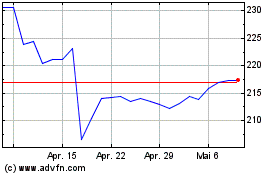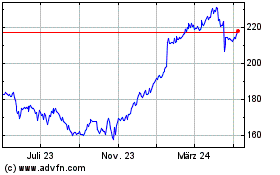Travelers Reports Loss as Catastrophe Costs Climb--Update
23 Juli 2020 - 9:59PM
Dow Jones News
By Leslie Scism and Allison Prang
Travelers Cos. swung to a second-quarter loss as the insurance
firm recorded catastrophe charges from severe storms in the U.S.
and the civil unrest sparked by George Floyd's death at the hands
of Minneapolis police.
The firm, one of the nation's biggest property-casualty
insurers, said its Covid-19 costs remained modest.
Travelers, typically the first of the big insurers to post
quarterly results, is a bellwether for the group. On Thursday, it
reported a loss of $40 million, or 16 cents a share, compared with
a year-earlier profit of $557 million, or $2.10 a share.
The company's stock was down 3.7% in afternoon trading.
Travelers recorded catastrophe charges of $854 million before
taxes, net of reinsurance. The firm's catastrophe costs were $367
million in last year's second quarter.
The coronavirus-related losses helped push its quarterly results
into the red, but analysts said the cost is easily manageable for
an insurer of Travelers' size. Travelers said before taxes it
tallied $114 million in second-quarter insurance losses attributed
to the pandemic, an impact blunted by favorable trends tied to
lockdowns, such as a reduction in driving activity and fewer
wrecks.
Industrywide pandemic-related losses could be significant, "but
they won't be borne evenly across insurers," said Travelers CEO
Alan Schnitzer, in an earnings call Thursday. Travelers executives
cited terms and conditions in policies as limiting the firm's
exposure.
Estimates put total insured claims for property-casualty
carriers at $50 billion to $100 billion, according to RBC Capital
Markets. At the low end, the damage would be equivalent to the
nation's costliest hurricane, Katrina in 2005, with about $53
billion of insured damages in 2019 dollars, according to trade
group Insurance Information Institute.
Covid-19 claims industrywide are rolling in from an array of
policyholders. Some examples are hospitals whose workers have
become infected and are collecting workers' compensation benefits;
restaurants and other nonessential businesses stung by the
lockdowns and seeking payments under "business-interruption" policy
provisions; and sporting events that had cancellation coverage.
At the same time, carriers have benefited during the pandemic as
the stay-at-home orders kept millions of cars off the street,
sharply reducing wreck claims. Employees working from home also are
less likely to generate workers' compensation claims. Among other
muted claims activity, Travelers noted that restrictions on dine-in
services at restaurants meant fewer slip-and-fall accidents
Mr. Schnitzer said the pandemic's impact on Travelers' workers'
comp business was limited because health-care workers and first
responders don't represent a significant part of the carrier's book
of business.
The company noted that workers' comp claims appeared to have
stabilized, possibly because more hospital and emergency workers
obtained better protective clothing and gear.
Travelers said that although its business-interruption coverage
typically excludes virus-related claims, it has booked an
unspecified amount for litigation as some policyholders look to
challenge rejections of their claims.
Car insurers' windfall from a sharp drop in miles driven under
stay-at-home orders may be diminishing. Travelers executives said
that the reduction in auto claims may be moderating as economic
activity picks up and policyholders resume driving.
Travelers, one of the biggest U.S. sellers of car insurance to
individuals and families by premium volume, provided 15% refunds of
premiums during the spring to its personal-auto policyholders, to
share its windfall. It said it doesn't plan future personal-auto
rebates, and will address changes in auto-accident trends through
rate adjustments.
All total, the nation's 10 largest car insurers have announced
plans to slash more than $6.5 billion in premium, according to
figures compiled by A.M. Best Co.
Travelers' net investment income before tax was $268 million,
down from $648 million. The drop is tied to a sliver of alternative
investments that are generally reported with a one-quarter lag and
follow the broader equity markets. U.S. stock markets plummeted in
March then surged in the second quarter.
Travelers said that due to PG&E Corp.'s emergence from
bankruptcy, it expects to release in the third quarter about $400
million before taxes of previously booked reserves tied to
reimbursement to insurers of losses they incurred for the
California wildfires in 2017 and 2018.
Write to Leslie Scism at leslie.scism@wsj.com and Allison Prang
at allison.prang@wsj.com
(END) Dow Jones Newswires
July 23, 2020 15:44 ET (19:44 GMT)
Copyright (c) 2020 Dow Jones & Company, Inc.
The Travelers Companies (NYSE:TRV)
Historical Stock Chart
Von Mär 2024 bis Apr 2024

The Travelers Companies (NYSE:TRV)
Historical Stock Chart
Von Apr 2023 bis Apr 2024
